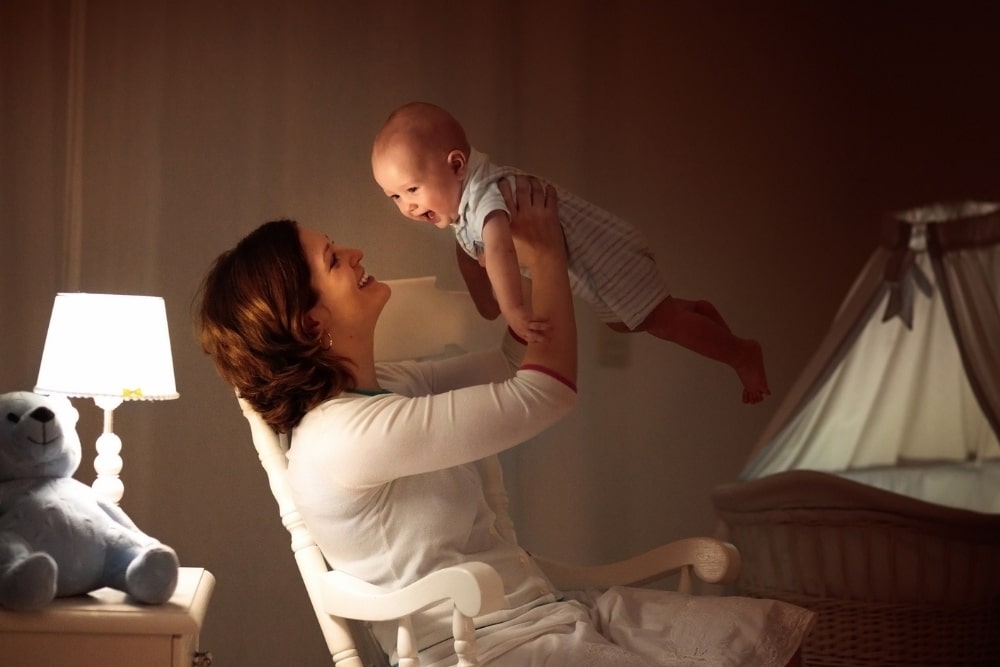Most parents have been woken by a scared child, shouting that there is something in the dark. With this in mind, many parents then wonder if their baby is afraid of the dark and if this is the reason that they are restless through the night.
Now there may be a variety of reasons why your baby is not sleeping as well as they once were such as teething, growth spurt, overtired or overstimulated.
But one question that many parents are asking is “Are babies afraid of the dark?” So let’s breakdown this question for you along with some possible tips and tricks to see you through.
Are Babies Scared Of The Dark?
To put it simply, no, children under the age of two are not yet developmentally capable of having a fear of the dark. After all, they have nothing to base their fear off.
Unlike older children and adults who have the imagination to think a shadow monster could be lurking in the closet or under their bed.
But this isn’t true for babies. They have just spent the best part of nine months in almost complete darkness, if anything the absence of light should be a comfort to them.
So what’s the issue then? Let’s take a look at some facts surrounding babies and the dark.
- Darkness is essential as it promotes the release of a hormone called melatonin that is crucial for your baby to have a good night’s sleep.
- A great way to help your child know the difference between night and day is by regulating their circadian rhythm. You can do this by waking them up and putting them to bed at a regular time.
- A baby who sleeps well in the day is also a baby that sleeps well at night. Poor day-time sleep will directly affect their night-time sleep.
What’s The Issue If It’s Not The Dark?
Parents tend to believe their child is afraid of the dark as a result of them sleeping poorly at night but this might not be the case.
- Sometimes a child can be overtired and as a result, become restless as their brain releases sleep-fighting chemicals.
- Allowing your baby to watch TV before sleeping may seem like a great idea in the moment, but this can actually disrupt their sleep. Children who watch TV at night are more likely to go to sleep later but also have trouble waking up.
How To Help Your Baby Deal With The Dark
White Noise
One way to help a restless little one is to place them in a dark room with some white noise playing in the background. This simulates the womb, although it’s dark it’s also noisy, babies will find this familiar, comforting and calming.
[amalinkspro type=”showcase” asin=”B01D50RYSC” apilink=”https://www.amazon.com/dp/B01D50RYSC?tag=mominformedcom-20&linkCode=osi&th=1&psc=1″ new-window=”true” addtocart=”false” nofollow=”true” sc-id=”4″ imgs=”LargeImage” link-imgs=”false” specs=”The Hushh effectively masks noises that may disturb or distract for improved sleep for adults, babies, and children~~~Choose from 3 soothing sounds: bright white noise, deep white noise, or gentle surf, then set the volume; features a child lock and gentle amber LED nightlight” btn-color=”#ff9900″ btn-text=”Check Price” alignment=”aligncenter” hide-prime=”0″ hide-image=”0″ hide-price=”0″ hide-button=”0″ width=”750″]Marpac Hushh Portable White Noise Machine for Baby[/amalinkspro]
Swaddling
Swaddling has proved to help babies younger than 5 months to sleep better for longer. If your baby cries while being swaddled, it could be because it is too hot or the swaddle isn’t tight enough.
[amalinkspro type=”showcase” asin=”B07NK31SJL” apilink=”https://www.amazon.com/dp/B07NK31SJL?tag=mominformedcom-20&linkCode=osi&th=1&psc=1″ new-window=”true” addtocart=”false” nofollow=”true” sc-id=”5″ imgs=”LargeImage” link-imgs=”false” btn-color=”#ff9900″ btn-text=”Check Price” alignment=”aligncenter” hide-prime=”0″ hide-image=”0″ hide-price=”0″ hide-button=”0″ width=”400″]Swaddle Blanket Baby Girl Boy Easy Adjustable 3 Pack Infant Sleep Sack Wrap Newborn Babies by Comfy Cubs (Small (0-3 Month), Gray)[/amalinkspro]
Night lights
Many children feel safer with a night light they can turn on and off, not only does this help with the darkness but it also helps your child feel in control. This is best used for older toddlers and children.
[amalinkspro type=”showcase” asin=”B0785DT97B” apilink=”https://www.amazon.com/dp/B0785DT97B?tag=mominformedcom-20&linkCode=osi&th=1&psc=1″ new-window=”true” addtocart=”false” nofollow=”true” sc-id=”5″ imgs=”LargeImage” link-imgs=”false” btn-color=”#ff9900″ btn-text=”Check Price” alignment=”aligncenter” hide-prime=”0″ hide-image=”0″ hide-price=”0″ hide-button=”0″ width=”400″]VAVA Home VA-CL006 Night Lights for Kids with Stable Charging Pad, ABS+PC Bedside Lamp for Breastfeeding, Touch Control&Timer Setting, White[/amalinkspro]
Expose them to light
A baby’s natural clock begins to regulate itself at around two to three months of age.
But by exposing them to natural daylight before this time, you can support the biological clock and regulate the melatonin hormone, helping your baby sleep better at night.
Things You Can do
View in gallery
Be Confident
When you put your baby to bed you know that they are safe. They are in a safe environment and they are well-loved and cared for.
You need to project this confidence to your baby when you are putting them to bed and they will feed off your confident and calm energy.
Say Goodnight
Routine is key with especially at bedtime. So make sure that you always say goodnight – no sneaking out of the room. Imagine how scary it is for your baby for you to be there one minute and then just gone the next.
When you leave the room, leave the room. Popping back and forth can be disturbing and confusing and can lead to further upset for your baby.
Practice
Separation anxiety can be so hard for babies as they do not fully understand that you will return. This needs to be practiced with them on a daily basis.
Try telling your baby that you are leaving the room, where you are going, and that you will be back. This will help them to learn that it is ok if you leave the room, everything will be ok while you are gone, and that you will return.
Be Patient And Give Your Baby Time
As with most things, this is simply another phase. Be patient and remember that your baby’s sleep needs haven’t changed and yes they are still capable of falling asleep independently.
But right now they need a little extra support and empathy. You could try placing them in their crib a little earlier than usual, giving them extra time to settle and fall asleep.
The Final Thought
Remember that your baby is not afraid of the dark and actually finds the dark quite reassuring. But it is more to do with a form of separation anxiety and it is also just a phase.
But while you are navigating this journey with them remember that they are still very small and need their sleep. If they are not getting enough rest then you are going to end up with an overtired baby.
When they are tired their body will produce sleep-fighting hormones that will make it even more difficult for you to get them back to sleep.






